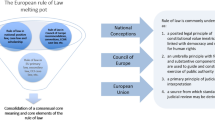Abstract
This article begins by clarifying the meanings attributed to pluralism; it then places the European case in a global context. The body of the article looks at the management of religious pluralism in Europe in terms of commonality and difference. At one and the same time, Europe is becoming increasingly secular and religiously plural—both trends are important if we are to understand the issues at stake. A close examination of four individual cases (Britain, France, the Netherlands and Greece) reveals, however, that it is important not to jump to conclusions regarding outcomes. Each country must be considered on its own terms. The final section introduces a rather different feature: the European Court of Human Rights, noting its place in the management of religious pluralism. A growing jurisprudence emanating from the Court is becoming increasingly influential.
Similar content being viewed by others
Notes
The economic situation in Europe has ebbed and flowed since 1945. Broadly speaking, new sources of labour are sought after in times of economic expansion, but are noticeably less welcome when the economy contracts and unemployment rises. The competition for jobs, housing and school places breeds resentments. Since 2004—a key date in the building of the European Union—there has been a notable movement of labour from East to West. This too caused difficulties following the global economic downturn that occurred in 2008.
The idea that religion is essentially a private matter has been embedded in European self-understanding for centuries rather than decades. The Peace of Westphalia (1648) constitutes a pivotal moment in this process.
Similar reservations towards specifically religious nomenclature can be seen in the social scientific community which, by and large, has been more at ease dealing with the secular categories of race and ethnicity.
That said the nature and provision of religious education in the different parts of the British school system remain controversial. How should a historically confessional subject be taught in a society which is both increasingly secular and religiously diverse?
It is important to note that the House of Lords is in the process of protracted reform. The position of the Bishops in the House of Lords may change. See http://www.parliament.uk/business/lords/lords-history/lords-reform/ for more details (accessed 12 December 2013).
In parenthesis it is worth noting that the position of the Church of Scotland is rather different, both theologically and constitutionally.
See for example the carefully prepared statements on the Prince of Wales’ official website: http://www.princeofwales.gov.uk/the-prince-of-wales/promoting-and-protecting/faith (accessed 12 December 2013)
Full covering (i.e. the niqab or the burqa) remains however controversial and raises difficult questions about security.
The extensive work of Jean Baubérot regarding laïcité is important in this respect. A list of his influential publications can be found on http://www.gsrl.cnrs.fr/spip.php%3Farticle153&lang=fr.html (accessed 12 December 2013).
For more information about this project and the publications emanating from it, see http://www.lboro.ac.uk/media/wwwlboroacuk/content/socialsciences/downloads/FINAL_REPORT_Fitna.pdf (accessed 12 December 2013).
An excellent overview of the religious situation in Greece, including the position of religious minorities can be found in Kokosalakis and Fokas (2012).
The Greek constitution can be found on http://www.hri.org/docs/syntagma/artcl25.html#A1 (accessed 12 December 2013). See also Kyriazopoulos (2001).
The details of this case, including the partly concurring opinion of Judge Pettiti, can be read on http://hudoc.echr.coe.int/sites/eng/pages/search.aspx?i=001-57827#{"itemid":["001-57827"]} (accessed 12 December 2013).
See also the statistics available at http://www.echr.coe.int/Documents/Stats_violation_1959_2012_ENG.pdf (accessed 12 December 2013).
See The European Convention on Human Rights, available at http://www.echr.coe.int/Documents/Convention_ENG.pdf (accessed 22 July 2014).
See The European Court of Human Rights: Questions and Answers, available at http://www.echr.coe.int/Documents/Questions_Answers_ENG.pdf (accessed 12 December 2013).
The details of these cases can be read on http://hudoc.echr.coe.int/sites/eng/pages/search.aspx?i=001-115881#{"itemid":["001-115881"]} (accessed 12 December 2013).
See also http://www.eliamep.gr/en/descriptions/project-descriptions/grassrootsmobilise/ (accessed 22 July 2014).
Further Reading
Beckford, J. 2003. Social Theory and Religion. Cambridge: Cambridge University Press.
Buruma, I. 2007. Murder in Amsterdam: The Death of Theo Van Gogh and the Limits of Tolerance. London: Atlantic Books.
Danopoulos, C. P. 2004. Religion, civil society, and democracy in Orthodox Greece. Journal of Southern Europe and the Balkans, 6(1), 41–55.
Davie, G. 2002. Europe: The Exceptional Case. Parameters of Faith in the Modern World. London: Darton, Longman and Todd.
Davie, G. 2006a. Religion in Europe in the 21st century: The factors to take into account. Archives européennes de sociologie/ European Journal of Sociology/ Europaeisches Archiv für Soziologie, 47/2, 271–296.
Davie, G. 2006b. Is Europe an exceptional case? The Hedgehog Review, 8, 23–34. a special issue entitled ‘After Secularization’.
Davie, G. 2015. Religion in Britain. Oxford: Wiley-Blackwell.
Fokas, E. 2013a. Unpublished intervention in a debate on ‘Rethinking religious-secular intersections’. Impact of Religion: Challenges for Society, Law and Democracy, Uppsala, Sweden.
Fokas, E. 2013b. Starting Grant application to the European Research Council, for project entitled: ‘Directions in religious pluralism in Europe: Examining grassroots mobilisations in Europe in the shadow of European Court of Human Rights religious freedom jurisprudence, (2014–2019)’ [GRASSROOTSMOBILISE].
Goudsblom, J. 1967. Dutch Society. New York: Random House.
Hervieu-Léger, D. 2001. La religion en miettes ou la question des sectes. Paris: Calman-Lévy.
Knott, K., Poole, E., & Taira, T. 2013. Media Portrayals of Religion and the Secular Sacred: Representation and Change. Farnham: Ashgate.
Kokosalakis, N., & Fokas, E. 2012. Greece: An overview of the national situation. In A. Bäckström (Ed.), Welfare and Values in Europe: Transitions related to Religion, Minorities and Gender, Volume 2. Uppsala: Uppsala Universitet. Available at http://www.crs.uu.se/publikationer/Skriftserier/Skriftserie_vid_CRS/. (accessed 12 December 2013).
Kyriazopoulos, K. 2001. The “prevailing religion” in Greece: Its meaning and implications. Journal of Church and State, 43(3), 511–538.
Martin, D. 1978. A General Theory of Secularization. Oxford: Blackwell.
Martin, D. 2013. Niche markets created by a fissile transnational faith. In R. Hefner, J. Hutchinson, S. Mels, & C. Zimmerman (Eds.), Religions in Movement. The Local and the Global in Contemporary Faith Traditions (pp. 180–195). New York and London: Routledge.
Triandafyllidou, A., & Gropas, R. 2009. Constructing difference: The Mosque debates in Greece. Journal of Ethnic and Migration Studies, 35(6), 957–975.
Author information
Authors and Affiliations
Corresponding author
Rights and permissions
About this article
Cite this article
Davie, G. Managing Pluralism: The European Case. Soc 51, 613–622 (2014). https://doi.org/10.1007/s12115-014-9834-6
Published:
Issue Date:
DOI: https://doi.org/10.1007/s12115-014-9834-6




